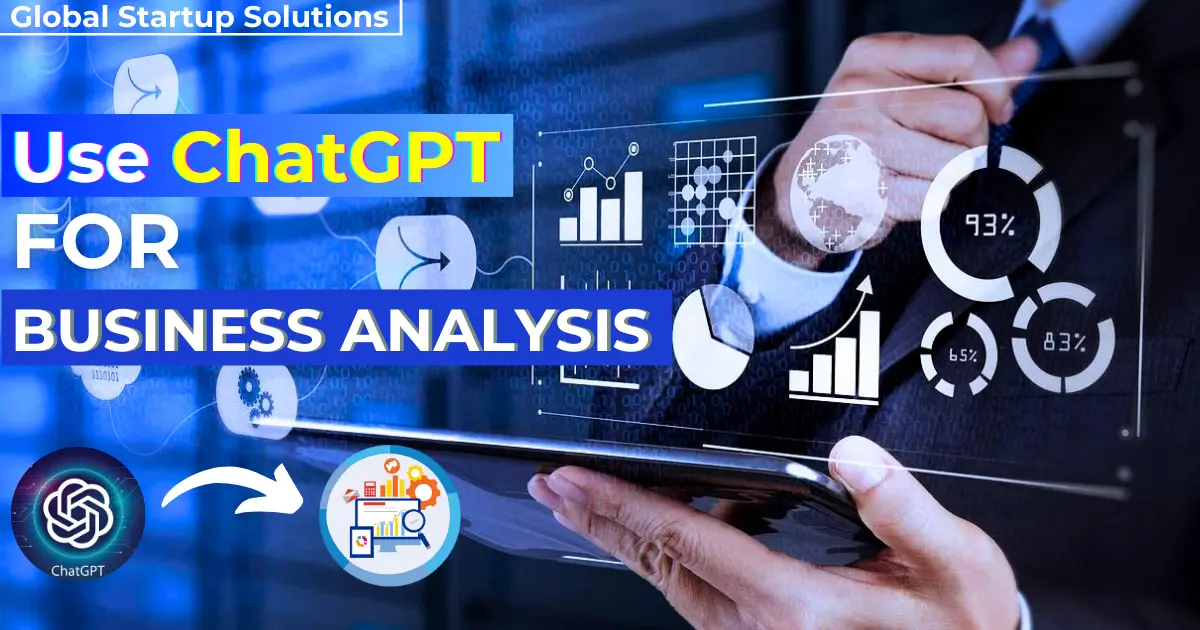Introduction
In today’s business world, you need to make smart decisions fast and be updated with new trends. If you want to use ChatGPT for Business Analysis then it can be good decision. OpenAI’s ChatGPT is an AI language model that can help you to solve your business problems quickly. It can understand and generate contents like human. So if you want to simplify your operations and get more insight then sure you can use ChatGPT.
ChatGPT and Business Analysis
ChatGPT is designed to talk to users in a conversational way so it’s easy to use for many applications. In business analysis ChatGPT can help with data interpretation, trend analysis and report generation. By using AI businesses can process huge amounts of data fast and accurately and make better decisions.
AI in Modern Business
AI tools like ChatGPT are becoming the normal in modern business. They offer:
- Automation: AI can do repetitive tasks so employees can focus on more strategic work.
- Accuracy: With AI human error is reduced so results are more reliable.
- Speed: AI can process huge amounts of data in a fraction of the time it would take a human.
- Insight: AI tools can find patterns and trends for your business that are not visible to the human eye, helps in business strategy.
Adding AI to your business will help you to improve productivity, better customer service and a competitive advantage. As technology advances the role of AI in business analysis will only get bigger so it’s worth investing in AI.
1. Understanding the ChatGPT
1.1. What is ChatGPT?
ChatGPT is an AI language model Created by OpenAI. It can understand and generate human texts based on the input given by you. This makes it useful in businesses for customer service, content creation and business analysis.
1.2. Features and Abilities
- NLP: ChatGPT is top level AI at understanding and generating text that sounds natural and conversational.
- Data Interpretation: It can interpret and summarise large datasets, so you can get to the good stuff.
- Trend Analysis: ChatGPT can find trends and patterns in data, so you can stay ahead of the curve.
- Report Generation: It can help you to generate reports based on the data you input.
- Customisation: ChatGPT can be customized based on your business needs, so it’s personal to you.
2. Why Use ChatGPT for Business Analysis?
2.1. Speed and Efficiency
One of the best benefits of using ChatGPT is that, it can process and decode data faster than a human. This means businesses can get the insights in a fraction of the time and make quicker decisions and respond to market changes faster.
2.2. Cost Savings
Using ChatGPT can save operational costs for your business. By automating daily tasks, you can save labour cost and spend more time in important works. And AI is more accurate so there’s less chance of costly mistakes.
2.3. Better Decision Making
ChatGPT gives you data and insights to make better decisions. It can interpret difficult datasets and find the important parts, so you can make better choices. This means better strategies, better performance and a stronger market position.
3. Getting Started with ChatGPT for Business Analysis
3.1. Sign Up with OpenAI
To use ChatGPT for business analysis, sign up with OpenAI. Go to the OpenAI website and sign up. Depending on your needs you may choose a free tier or a paid plan with more features and higher limits.
3.2. Choose a Platform or API
ChatGPT can be accessed through different platforms or integrated into your existing systems via APIs. Choose a platform that suits your business:
- OpenAI Platform: Direct access through OpenAI’s website for basic use and exploration.
- API Integration: For advanced use, integrate ChatGPT into your own applications using OpenAI’s API. This allows for custom interactions and automation within your existing systems.
3.3. Basic Setup
Once you’ve chosen a platform, follow these steps to set up ChatGPT:
- Get the API Key: If you’re using the API, get your API key from the OpenAI dashboard.
- Integrate the API: Implement the API in your business systems according to the OpenAI documentation. This will involve coding in languages like Python or JavaScript.
- Configure: Adjust settings to suit your business needs. This may include setting text generation or customising how it interacts with your data.
4. Where ChatGPT Can Help with Business Analysis
4.1. Market Research
ChatGPT can gather and summarise market research data. It can read industry reports, find market trends and consumer behaviour, so you stay up to date with the market.
4.2. Competitor Analysis
Use ChatGPT to review and analyse competitor information. It can scan publicly available data, compare competitor offerings and highlight strengths and weaknesses, so you have a clearer view of your competitive position.
4.3. Financial Forecasting
ChatGPT can help with financial forecasting by reading historical financial data and predicting future trends. It can create financial models and generate forecasts, so you can plan your budget and financial strategy.
4.4. Customer Sentiment
Analyse customer feedback and sentiment with ChatGPT. It can read reviews, social media comments and survey responses to understand customer opinions and preferences, so you can better understand your audience and refine your business.
4.5. SWOT
ChatGPT can do a SWOT analysis (Strengths, Weaknesses, Opportunities, Threats) by reading internal and external factors affecting your business. It will help you identify areas to improve and opportunities to grow, so you can plan your strategy.
5. How to Write Good ChatGPT Prompts for Business Analysis
5.1. What is Prompt Engineering
Prompt engineering is the art of crafting and refining prompts to get the best out of ChatGPT. Good prompts are important because they tell the AI what to look for. A well written prompt makes all the difference in the quality of the insights you get.
5.2. Clear and Specific Prompts
The key to getting useful answers from ChatGPT is clarity and specificity. Clear prompts tell the AI exactly what you want, so it reduces the chance of unclear or irrelevant answers. Specific prompts give context and direction so you get more precise and actionable insights.
6. ChatGPT Prompts for Business Analysis
6.1. Market Research
- Prompt: “What’s the latest in [industry]?”This prompt keeps you up to date with the latest trends in a specific industry, so you can see emerging opportunities and challenges.
6.2. Competitor Analysis
- Prompt: “Compare [Company A] and [Company B].”Use this prompt to get a full comparison of two companies, including market position, products and competitive advantage.
6.3. Financial Forecasting
- Prompt: “What will be [Company]’s revenue next year?”This prompt generates forecasts based on historical data and current market conditions so you can plan your budget and financial strategy.
6.4. Customer Sentiment Analysis
- Prompt: “Summarize the customer reviews of [Product/Service].”This prompt tells ChatGPT to process and summarise customer feedback so you can see how your product or service is viewed by your customers.
6.5. SWOT Analysis
- Prompt: “SWOT [Company/Product].”This prompt will generate a SWOT analysis for your company or product, so you can see the strengths, weaknesses, opportunities and threats for your business.
7. Best Practices for Using ChatGPT in Business Analysis
7.1. Keep Data and Prompts Up to Date
To get correct and relevant insights from ChatGPT, you need to keep both your data and prompts up to date. Fresh data gives ChatGPT current and relevant information, and updated prompts reflect changes in your business needs and goals. Regular maintenance means the insights stay valuable and actionable.
7.2. AI + Human Expertise
ChatGPT can give you great analysis and insights, but it’s best used with human expertise. AI generated insights plus human knowledge and experience equals better decision making. Humans can interpret nuance, validate findings and add context that AI might miss. This is a good winning combination for your business.
7.3. Data Privacy and Security
When using ChatGPT for business analysis, protect your important data. Ensure any data you share with ChatGPT aligns with your data privacy policies and regulations. Don’t input confidential or proprietary info and use any security features the platform provides. Review your data handling regularly.
Learn More:
- Top 10 Must-Have AI Tools for Your Business Growth
- Top 10 Best Banks For Startups in 2024
- Top 5 Unique Tech Startup Ideas for 2024
8. Case Studies
Real-Life Examples of Businesses Analyst Using ChatGPT for Analysis
- E-Commerce Retailer: An e-commerce retailer used ChatGPT to analyze customer reviews and feedback. It generated detailed sentiment reports and found areas to improve the product. Customer satisfaction went up and so did the positive reviews and sales.
- Financial Services Firm: A financial services firm plugged ChatGPT into their forecasting process. The AI analyzed historical data and market trends to give them revenue forecasts. Accurate predictions helped them plan their investments better and manage resources.
- Marketing Agency: A marketing agency used ChatGPT for competitor analysis. The AI generated competitor comparisons and found strengths and weaknesses. This helped them refine their marketing strategy and get ahead of the competition.
Takeaways and Results
- Time Savings: Businesses found ChatGPT saved them time in data analysis and report generation so they could focus on more strategic work.
- Accuracy: The AI processed large amounts of data to reduce errors and improve forecasts and analysis.
- Deeper Insights: Companies got better insights into market trends, customer sentiment and competitive positioning to make better decisions and perform better.
Conclusion
ChatGPT has many benefits for business analysis: speed, cost and better decision making. By using AI you can get insights fast and accurate and stay ahead and make more informed strategic decisions.
As AI gets better, integrating ChatGPT into your strategy will be a big plus. Try and adapt it to your needs and you’ll open up new opportunities and growth.
Try ChatGPT for Your Business Analysis Needs
If you’re interested in exploring how ChatGPT can help your business, start by sign up an account and experimenting with different prompts and use cases.
Resources and Further Learning
Explore these resources to get started and discover how ChatGPT can improve your business analysis processes.

